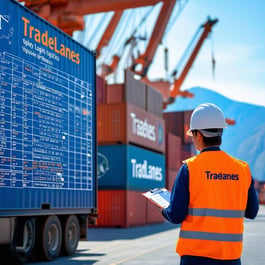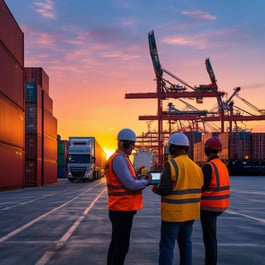How global trade lost its rhythm - and how exporters are learning to adapt.
The Clocks of Global Trade Are Broken
For decades, global trade ran on time.
A vessel schedule was a promise, not a guess.
A planner could open Excel, check a carrier site once a week, and feel in control.
That world is gone.
Ships now miss their ETAs by days - sometimes weeks. Schedule reliability has plunged back to pandemic-era lows, and no one believes it’s coming back.
The clocks of global trade are broken.And the exporters still setting their watch by them are being left behind.
You’re Not Crazy
You’re probably thinking:
“It’s always been chaotic - we’ve just learned to manage it.”
You’re not wrong. You’ve lived through tariffs, strikes, and canal closures. You’ve adapted.
But this is different.
It feels like every logistics team is working harder than ever - yet somehow, less in control. Every ERD change, every blank sailing, every “schedule revision” email lands like a gut punch.
The same systems that once kept shipments predictable are now the very ones amplifying the chaos.
Welcome to what we call Spreadsheet Logistics - the old game of managing volatility with tools built for yesterday’s world.
Manual. Lagging. Breaking.
The End of Reliability
According to Sea-Intelligence, global schedule reliability averaged just 70% during the tariff period - the lowest on record at that time. By 2019, late vessels were arriving an average of four days behind schedule.
The “just-in-time” era didn’t fade quietly. It collapsed.
For thirty years, exporters built their playbook on one assumption: reliability would always return. It won’t.
We’ve entered an age of permanent volatility - where disruption isn’t a phase; it’s the baseline.
In this world, visibility alone isn’t enough. It’s not about seeing what happened. It’s about responding before disruption hits.
Reliability has died. Intelligence replaces it.
From Visibility to Intelligence
So what does that mean in practice?
It means exporters no longer track schedules - they stream them.
They don’t just collect data - they validate it.
And decisions aren’t reactive - they’re automatic.
At the center of this shift is a simple, continuous loop:
Collect. Validate. Adapt.
- Collect: Real-time feeds from carriers, terminals, and inland rail (Ava’s Port Stress Index and ERD Volatility data give exporters a live pulse of schedule shifts).
- Validate: Reconcile conflicts and surface one verified truth - what Ava calls “signal over noise.”
- Adapt: Trigger automatic updates to drayage, documentation, and inland plans before a human ever has to check.
This is the logic behind Vessel Schedule Intelligence - a new operating model for a world that refuses to sit still.
Proof That It Works
Early adopters running on Vessel Schedule Intelligence have cut schedule lag by 70% within 30 days, reducing rolled shipments and re-handling costs across inland ramps.
They’ve replaced spreadsheets with systems that see, decide, and act in real time.
In Export5™ terms, they’ve moved from watching the risk signal to controlling it.
When their Vessel Schedule Disruption Risk (VSDR) crosses 0.6, contingency planning activates automatically.
When the Export Delay Probability Score (EDPS) spikes, Ava pre-alerts their drayage and warehouse teams before a single box misses cutoff.
They’re no longer surviving volatility.
They’re turning it into a competitive advantage.
From Spreadsheet Logistics to Schedule Intelligence
This shift isn’t theoretical - it’s visible in every inland ramp report.
Late 2018 taught us what happens when exporters depend on unreliable clocks: 10+ ships at anchor off Los Angeles, 140-minute truck turn times, and billions in demurrage and lost sales.
Export5™ quantifies that chaos - and replaces guesswork with foresight.
Because reliability isn’t a promise anymore. It’s a variable to model.
Join the New Operating Model
The reliability era is over.
The intelligence era has begun.
Ava is the intelligence layer that makes it real - automating the Collect-Validate-Adapt loop across ports, terminals, and inland ramps.
This is how global trade learns to move again - not by waiting for reliability to return, but by building systems that thrive without it.
Join the exporters already running on Vessel Schedule Intelligence.
👉 Join the New Operating Model
Collect. Validate. Adapt.
The system that turns unreliability into advantage.





Leave a Comment